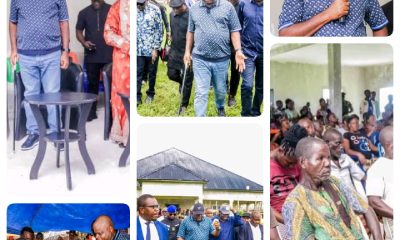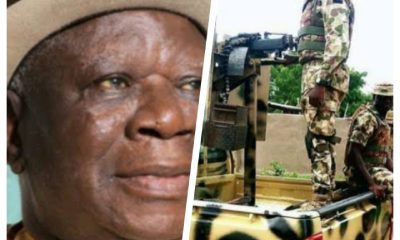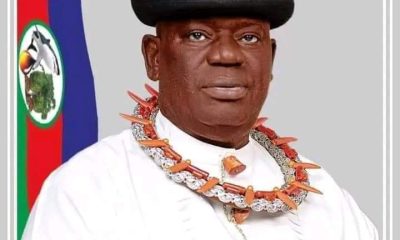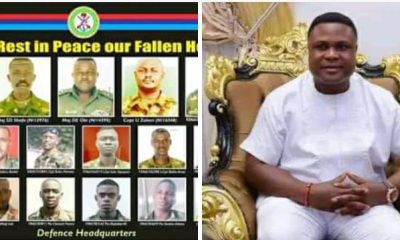Editorial
OKUAMA/IGBOMOTOROU/ THE MILITARY: A SPRING OF BITTER TRUTHS.
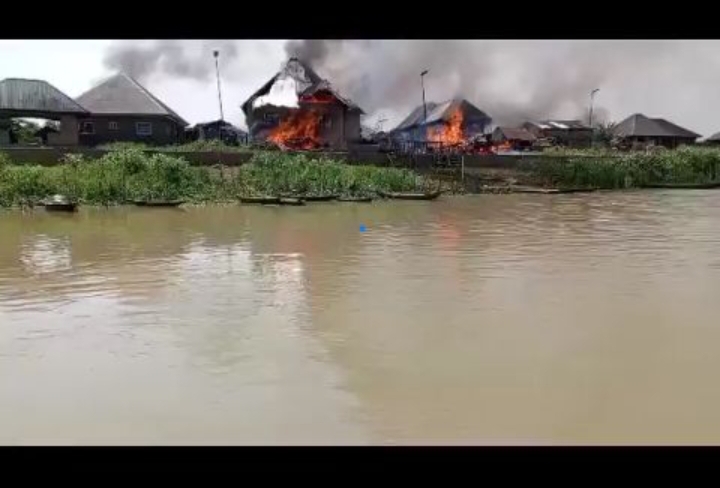
OKUAMA/IGBOMOTOROU/ THE MILITARY: A SPRING OF BITTER TRUTHS.
By Tobouke JEMINE
It is a painful, tormenting, and devastating separation from life. The mortalities on both sides will be hard for the mourning mornings and uneventful evenings to forget. Again, our sympathy and condolences to the families, loved ones, friends, colleagues and well-wishers of the departed souls.
About two days ago, while responding to the military version of a dear brother regarding the present fate of Okuama and Igbomotorou on a WhatsApp Town Hall, I said to him that, the sticks of a bunch of broom used to kill a fly may appear united, but by their lengths, or widths, or colours, or positions you may discover that the dirt of guilt is not smeared on all the sticks.
No one with a sane mind will justify the gruesome killing of the military doves. Countless times, that awful act against the official men of arms will be condemned. And numberless times, let the haphazard and amateurish retaliation of the army against those human habitations be condemned as well.
There are people in Okuama and in Igbomotorou, I choose to believe, who may not fight a just war, even if they are pushed or legally backed. They are probably among the victims now. Should such peaceniks suffer torture ,loss and death on account of the sins of others? Are we taking precedence into consideration when we burn the crops and the weeds together because they are from the same soil?
I’m sure not every child, not every pregnant woman, not all the aged, not all the sick, not all the elders and not even all the youths in Okoloba and Okuama give lethal endorsement as the best means of resolving the land dispute, talk less of endorsing the murder of a military peace-mission. Yet the professional empathy of the armed forces looked away from these facts and launched retaliatory actions against Okuama, and more unfairly, Igbomotorou. How just is that?
I came across a legal statement made by the renowned and formidable lawyer and human rights activist, Femi Falana concerning the military reprisal, where he said:”Nigeria domesticated the Geneva Convention in 1960 and under Article 33 of the the Geneva Convention, collective punishment is prohibited. Innocent people cannot be attacked, even in a war situation.” And that is enough to settle this case in a sane clime.
But we are still in that continent and in that society that was once notoriously dominated by military dictatorships, and they brutalized at will, destroyed impulsively, decreed death with impunity and give no place to national conscience in their dealings.That horrible background is still influencing the foreground of military operations in our country till date.The military in societies without the appalling experience of military dictatorships don’t talk and act like our own men of arms.
In this country, we have soldiers go online boasting that they can-do-and-undo. They claim to be mightier than the Law that established that institution and spelt out their functions and obligations. They put civilians through cruel indignities. They want civilians to see them as demigods. They want even our innocence to tremble at their presence, treating civilians as if they are subordinate citizens, and as if they are less human.
Once upon a time the Nigerian military had the mentality of ruling this country successively… but certain civil weapons were deployed to recreate that mindset — the military reunited with her constitutional place as protectors of the sovereignty of this country and guardians of the life, property and dignity of the citizens, leaving AsoRock for civilians. Those civil methods are needed again to give the army further schooling in military-civilian relationship.
There is obviously the need to present a bill in our national law-factories to stop military bombardment of communities over the crimes of individuals or groups. Culprits should be professionally fished out and made to face the interpretation of the Law of the land. Even if the king of a kingdom commits crimes against the state or the army, he and he alone, or he and his accomplices should be the ones to answer the questions of the Law, not the entire land. Slaying the innocent and destroying properties that have the mark of Legal Passover on them because of some criminals is cruel, crude, brute and barbarous.
Criminal elements that can bring this sort of military doom to a family, a community or a clan are not fated to Okuama and Igbomotorou alone. Your community can make the next news headline for a similar fate. But if we feel that it is right for the military to take down a whole community because of the iniquities of some persons, then a day will come, and it is already here, when we will be discouraged from building houses and setting up businesses in our ancestral homes — and finally we will end up seeking safety in another man’s land. May that day never manifest when humanity is still drawing life’s meaning from acquatic wonders and from the Breath of the Sea.
I dare to emphasize that, Might is not a synonym for Justice.Military terrorization and subjugation of coastal communities in the Nigerdelta has always been the triumph of Might, not Justice; only Machiavellian stratagem, biased exteriority — and probably with a pricking internality — will make us to say the contrary.
We condemn the reprisal attack, not just because of the innocents in Okuama, but because it has been the manner and method of the Nigerian Military Force whenever a crime of this nature is perpetrated in coastal Niger Delta. History is replete with proofs.
One of my maternal communities, Agge in Ekeremor LGA of Bayelsa State was unfortunate with the military. It was burnt down on August 4th, 2009 by the army based on an unverified information that some Agge youths were among those who carried out crimes against the state. This peace-loving people woke up to the savegeness of the military on that day without any premonition of the doom that awaited their Innocent Sleep.
MEND’S Camp 5 and others were stationed in the creeks far away from communal habitations, but when the military invaded Gbaramatu Kingdom in 2009, Oporoza, Ekenrenkoko, Kurutie and others were not spared, they were razed in the guise of manhunting the Priest of Nigerdelta and the MENDists. How fair?
Today, if you go to that my maternal community by the Atlantic Ocean, there are military checkpoints where you will have to put out your hands in the air before further passage will be granted you. And yet the same disdainful treatment is not given to travellers in the north where bandits commit all sorts of atrocities against civilians and the military.
I was in a northern town of recent where we heard exchange of gunshots between the army and bandits both day and night, yet I didn’t get to witness road users being harassed, or the town being invaded or turned to detritus.
Many crimes have been committed against coastal Nigerdelta, and the Nigerian civil populace in Nigeria by the military, yet no measure of justice has been meted out against that institution. They have pauperized, rendered homeless and killed thousands of innocent souls in their search for criminals in littoral Nigerdelta and gone scot-free. Today, if our cry is limited to justice for the gruesome killing of the military pacifists, and not to the innocents in Okuama, Igbomotorou and nearby communities, we should know that we are not sincere, fair and just in this issue.
Those who are one-sided on this issue like Governor Oborevwori and Henry Daniel-Ofongo, an indigene of Igbomotorou, and former Member, Federal House of Representatives, who are not addressing the savage retaliations of the military, are sure saying that those civilians killed indiscriminately and extrajudicially are not human enough and that there is a law in this country that permits the military to kill at will and raze a community over an individual sin. That is too tormenting to humane and sane sensibilities to deal with.
Thanks to Prof. Benjamin Okaba who stood for justice; the lawyer and human rights activist, Liborous Oshoma who spoke Truth to power, and the Urhobo youth leader, Blessed Ughere who while condemning the killing of the military officers, also cried out against the murderous return of the military against his people. I feel ashamed that our own man from Igbomotorou whose community is not the actual scene of the act was speaking trash on a national television. The likes of Ofongo are wrong voice for the Ijaw cause.
Let not the innocent go down for the crimes of the guilty; let the innocent live that he may preach the Beauty and Precepts of a Society where Justice is highly prized to his children and his children’s children.
Hate me if you wish, but I beg you not to hate the Truth I speak here, because you may need this same Truth by your side one day.
Karma, I like to say, is not a myth.
The wisdom of Jesus Christ will forever be relevant: “Do unto others what you would like to be done unto you”.
Editorial
Is Dubai A Country? Inside the Seven Kingdoms of the United Arab Emirates

By: Editorial Team
The United Arab Emirates (UAE), often hailed as a beacon of modern development in the Middle East, is a federation of seven emirates—each with its own distinct history, ruler, and cultural identity. Since its unification in 1971, the UAE has stood as a rare example of how traditional monarchies can collaborate to build a stable and globally respected nation.
At the heart of the federation lies Abu Dhabi, the capital and largest emirate, known for its vast oil wealth and political influence. The Al Nahyan family, which leads Abu Dhabi, has played a central role in shaping the UAE’s national vision and foreign policy. The current President of the UAE traditionally comes from this emirate, underscoring its leadership within the union.
Dubai, the shining star of the federation, represents ambition and innovation. Under the leadership of the Al Maktoum family, Dubai has transformed from a desert outpost into a global hub for finance, tourism, and technology. Its breathtaking skyline, led by the Burj Khalifa, has become a symbol of Arab progress and resilience.
Moving beyond the two powerhouses, Sharjah distinguishes itself as the cultural and educational capital of the UAE. Led by the Al Qasimi family, it has preserved the emirates’ artistic heritage while promoting academic excellence through its numerous universities and museums.
The smaller emirates-Ajman, Umm Al-Quwain, Ras Al Khaimah, and Fujairah-each add unique character and strength to the federation. Ajman, the smallest, thrives on trade and manufacturing; Umm Al-Quwain offers a peaceful charm along its quiet shores; Ras Al Khaimah, nestled against the Hajar Mountains, is known for its natural beauty and growing industrial base; and Fujairah, facing the Gulf of Oman, plays a strategic maritime role in the region’s economy.
Despite their differences in size and resources, the seven emirates remain bound by shared values, mutual respect, and visionary leadership.Their collective success story reflects not only unity but also the ability to balance tradition with progress.
Over five decades after its founding, the UAE continues to prove that cooperation among monarchies can yield a modern, forward-looking state-one that honors its past while boldly stepping into the future. The federation’s model of governance offers an enduring lesson in leadership, stability, and nation-building in a region often defined by division.
Photo Credit: shuterstock
Editorial
The Modern Avatar of Agadagba
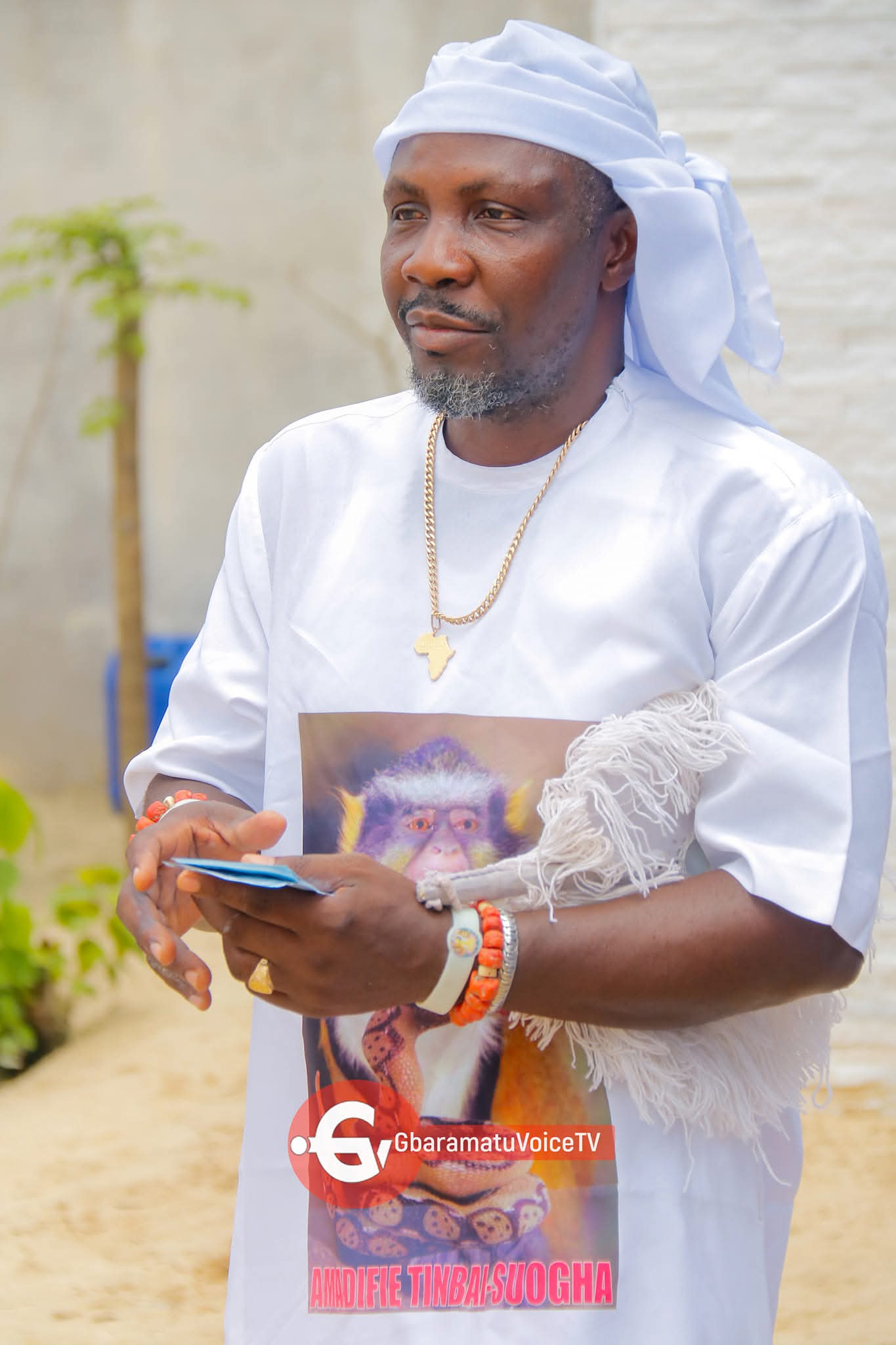
Editorial – IduwiniVoice
Government Oweizide Ekemupolo is 4th Century descendant of The progenitors of the Oru tribe, the archetypal Ijaws, who settled in the central Niger Delta and over time, who developed and spread to the entire Niger Delta. He his an embodiment of the ancient and modern ways and forces of the ijaw ancestral greats, ruled my ancient spiritual and human laws, a man and a superman.
Prior to 1600 AD, the Ijaws first and formally formed city-states on their island of abode in Central Niger Delta. The city-states were named Agadagba-bou, Isomou-bou, and Opugla-bou. The popular city-state was called Agadagba-bou, which, according to history, flourished for 400 years until it got abandoned in 1050 CE. That was the period Ijaw people migrated within the central Niger Delta and spread to the Western and Eastern Niger Delta.
Agadagba-bou, Isomou-bou, and Upugla-bou, which represented the Ijaw civilization at the historical island, long before it was named Wilberforce Island, had cultural, spiritual, linguistic, and occupational homogeneity.
They were all worshippers and believers of the sky God. The sky God that the Ijaws call today, even from ancient times, is Egbesu. It is believed that the Wilberforce Island was known as a forest named after Agadagba, the most powerful chief priest of Egbesu, who also doubled as the military general of the Izon nation.
Agadagba-bou, as a nomenclature, derives its bearing from Agadagba, the chief priest and generalissimo who once reigned on the Wilberforce Island. It is certain that the island hosted the Ijaw nation long before the time of Agadagba because Agadagba was appointed a chief priest and military general during his time by a potentate ruler of Ijaw nation.
In the primordial mists of time, Agadagba, the illustrious military general and chief priest of Egbesu, strode forth from the hallowed grounds of Agadagbabou, his footsteps echoing through the annals of Ijaw history. This revered figure, a paragon of martial prowess and spiritual wisdom, embodied the dual essence of his people, wielding the sword and the sacred staff with equal aplomb. The whispers of the ancients tell us that Agadagba’s reign predated the 1600 AD, a bygone era when the Ijaw nation thrived in harmony with the rhythms of the Niger Delta.
Agadagbabou, the cradle of Ijaw civilization, slumbers beneath the weight of centuries, its sacred soil serving as the final resting place of the ancestral spirits. Here, the venerable dead lie entombed, their ethereal essences lingering, awaiting the supplications of their descendants. Alas, the diaspora of the Ijaw people has occasioned a lamentable disconnection from these archetypal forebears, a severance that has hindered the unfettered flow of ancestral blessings, those numinous benedictions that are the birthright of every society.
For it is an immutable truth that the progress of a people is inextricably linked to the approbation of their ancestors.
The epochs have passed, and Agadagba’s terrestrial sojourn has long since drawn to a close, yet the imperishable essence of this legendary figure endures, awaiting reification in the mortal coil. Behold, 4.18 CENTURIES AFTER AGADAGBA, PRICESELY FOUR CENTURIES PLUS, in this our age, Government Oweizide Ekemupolo, a worthy scion of the Ijaw nation, has arisen, invested with the sacred mantle of Egbesu’s chief priest and military general. The symmetries are striking, the correspondences unmistakable: Ekpemupolo stands forth as the avatar of Agadagba, a reincarnation of the primordial hero, reborn to reclaim the lost patrimony of his people.
As we gaze upon Ekpemupolo, we behold the rekindled flame of Agadagba’s indomitable spirit, a fiery essence that refuses to be extinguished. The mythopoeic imagination whispers secrets in our ear, intimating that this modern-day embodiment of Ijaw valour and spirituality is, in truth, a Priest of the ancient mysteries, a hieratic vessel ordained to restore the pristine glory of Agadagbabou and reestablish the vital link between the living and the ancestral dead.
Thus, the epicycle of time turns full circle, as the reincarnated Agadagba, in the person of Ekpemupolo, strides forth to reclaim his rightful place within the sacred precincts of Ijaw tradition. The word is a witness to his spiritual and endeavours which catalyse a renaissance of the Ijaw spirit, rekindling the ancestral fires that burn bright within the collective unconscious of this venerable people, and guiding them toward a future illuminated by the radiant glow of their archetypal forebears.
As Tompolo’s efforts continue to bear fruit, Nigeria’s economic landscape is transformed, and the nation’s people reap the benefits of his tireless endeavours. His legacy will forever be etched in the annals of Nigerian history, a shining testament to the power of visionary leadership and unwavering dedication to the nation’s progress.
Benedict Binebai is a Professor of African Literature, a Social Conscientizer, and a Critic of outstanding repute.
(c) IduwiniVoice
Editorial
A Magnificent Gesture of Philanthropy: Tompolo’s Landmark Donation 10 Billion Naira to Delta State Government
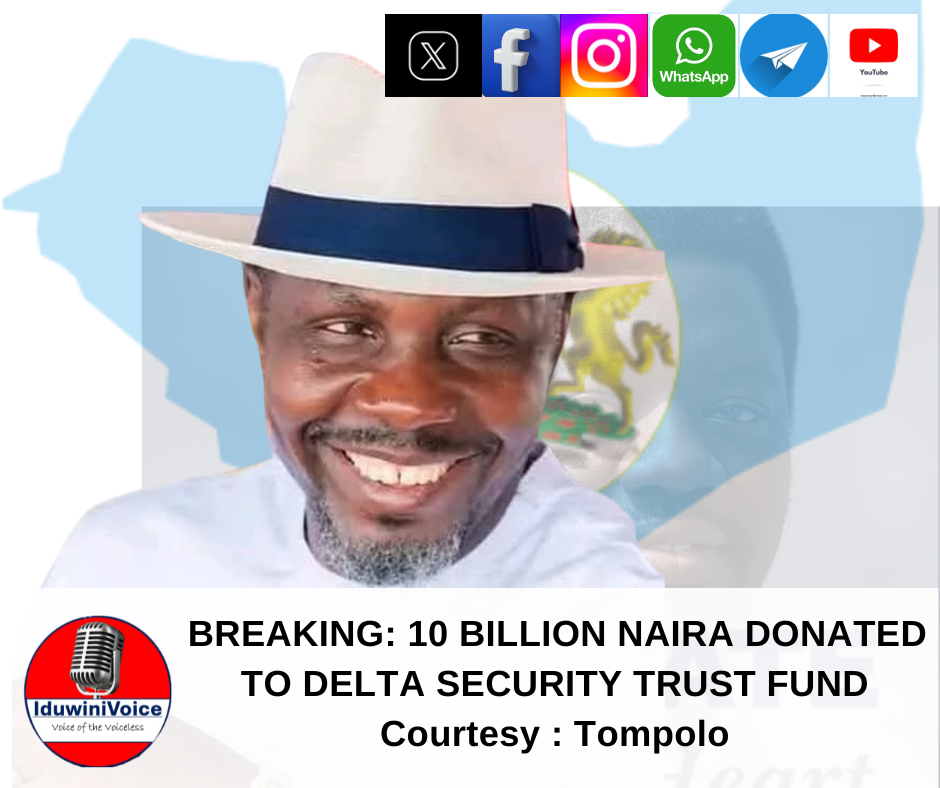
Editorial
Chief Tompolo’s most generous bestowal of 10 billion naira upon the Delta State Security Fund is a magnificent affirmation of his steadfast devotion to the betterment of his beloved homeland. This munificent act not only underscores his profound solicitude for the well-being of the citizenry, but also serves as a sonorous confirmation of his dedication to the edification of the nation.
This magnificent donation bespeaks Chief Tompolo’s perspicacious vision for a Delta State wherein the territorial integrity, individual safety, and proprietary rights of its inhabitants are zealously safeguarded and protected. For it is an immutable truth that security constitutes a fundamental pillar for peaceful and progressive human existence, and a people that get security right are a people who enjoy prosperity, stability, and tranquillity. His largesse constitutes a clarion call to all right-thinking Nigerians to emulate his exemplary conduct, thereby contributing to the realisation of a more stable and prosperous nation.
As a private individual, Chief Tompolo’s remarkable munificence distinguishes him as a true architect of society, a philanthropist of discerning taste, and a stalwart champion of both private and public institutions. His actions evince a profound comprehension of the intricate nexus between security, patriotism, and nation-building, and serve as a shining exemplar for others to follow.
In the pantheon of benevolent figures, Chief Tompolo’s deed resonates with the selfless generosity of mythical beings like Prometheus, who defied the gods to bestow the gift of fire upon humanity, or Hercules, who cleansed the Augean stables to bring prosperity to the land. Like these fabled heroes, Chief Tompolo’s philanthropy emanates a profound sense of altruism, illuminating the path towards a brighter future for the people of Delta State.
By this singular act, Chief Tompolo has floated a most compelling narrative that the Ijaw nation, and indeed all ethnic groups in Nigeria, have a critical role to play in shaping the country’s destiny. His donation is a puissant statement that the resources and talents of Nigerians, regardless of their region or ethnicity, can be harnessed to forge a more united, secure, and prosperous nation, and that the Ijaw people, in particular, are committed to contributing to the construction of a brighter Nigerian picture.
Chief Tompolo’s unprecedented gesture inaugurates a new paradigm of leadership for the Ijaw nation, one that radiates an unparalleled aura of generosity, vision, and selflessness. This luminous exemplar of leadership kindles a guiding light, illuminating a path towards a more prosperous, equitable, and enlightened future for the Ijaw people, and serves as a resplendent model for leaders across Nigeria and beyond, demonstrating that true greatness is measured by the ability to uplift and empower one’s community.
Benedict Binebai is a Professor of African Literature, Public Speaker, and a renowned critic of intellectual acclaim.
(c) IduwiniVoice

